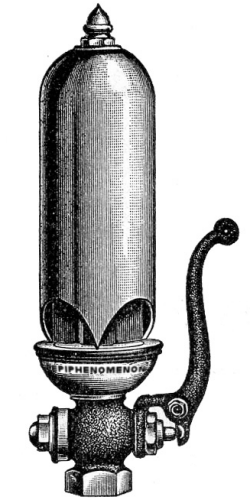 Physical determinism is implausible according to Richard Swinburne in the latest JCS; he cunningly attacks via epiphenomenalism.
Physical determinism is implausible according to Richard Swinburne in the latest JCS; he cunningly attacks via epiphenomenalism.
Swinburne defines physical events as public and mental ones as private – we could argue about that, but as a bold, broad view it seems fair enough. Mental events may be phenomenal or intentional, but for current purposes the distinction isn’t important. Physical determinism is defined as the view that each physical event is caused solely by other physical events; here again we might quibble, but the idea seems basically OK to be going on with.
Epiphenomenalism, then, is the view that while physical events may cause mental ones, mental ones never cause physical ones. Mental events are just, as they say, the whistle on the locomotive (though the much-quoted analogy is not exact: prolonged blowing of the whistle on a steam locomotive can adversely affect pressure and performance). Swinburne rightly describes epiphenomenalism as an implausible view (in my view, anyway – many people would disagree), but for him it is entailed by physical determinism, because physical events are only ever caused by other physical events. In his eyes, then, if he can prove that epiphenomenalism is wrong, he has also shown that physical determinism is ruled out. This is an unusual, perhaps even idiosyncratic perspective, but not illogical.
Swinburne offers some reasonable views about scientific justification, but what it comes down to is this; to know that epiphenomenalism is true we have to show that mental events cause no physical events; but that very fact would mean we could never register when they had occurred – so how would we prove it? In order to prove epiphenomenalism true, we must assume that what it says is false!
Swinburne takes it that epiphenomenalism means we could never speak of our private mental events – because our words would have to have been caused by the mental events, and ex hypothesi they don’t cause physical events like speech. This isn’t clearly the case – as I’ve mentioned before, we manage to speak of imaginary and non-existent things which clearly have no causal powers. Intentionality – meaning – is weirder and more powerful than Swinburne supposes.
He goes on to discuss the famous findings of Benjamin Libet, which seem to show that decisions are detectable in the brain before we are aware of having made them. These results point towards epiphenomenalism being true after all. Swinburne is not impressed; he sees no basic causal problem in the idea that a brain event precedes the mental event of the decision, which in turn precedes action. Here he seems to me to miss the point a bit, which is that if Libet is right, the mental experience of making a decision has no actual effect, since the action is already determined.
The big problem, though is that Swinburne never engages with the normal view; ie that in one way or another mental events have two aspects. A single brain event is at the same time a physical event which is part of the standard physical story, and a mental event in another explanatory realm. In one way this is unproblematic; we know that a mass of molecules may also be a glob of biological structure, and an organism; we know that a pile of paper, a magnetised disc, or a reel of film may all also be “A Christmas Carol”. As Scrooge almost puts it, Marley’s ghost may be undigested gravy as well as a vision of the grave.
It would be useless to pretend there is no residual mystery about this, but it’s overwhelmingly how most people reconcile physical determinism with the mental world, so for Swinburne to ignore it is a serious weakness.
